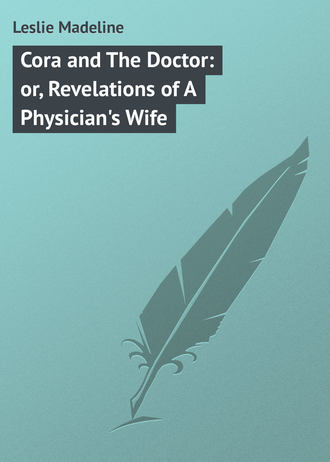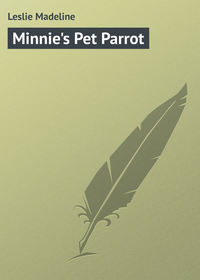
Cora and The Doctor: or, Revelations of A Physician's Wife
"Mr. Jones knows well how to sympathize with him in his efforts to reform."
"Yes," and a curious look passed over her face. "But he told William at last that he could not keep it from him any longer. Thomas did indeed go with him to the tailor's, and order the garments, but it was by direction of your good husband, who paid the bill."
"Oh! Frank," said I to myself, "you've begun to have secrets and to keep them from me." Yet I was quite delighted that my husband's
"Charity everFinds in the act reward, and needs no trumpetIn the receiver."As we were leaving, Mrs. Reynolds said, "I walked last evening to our old home, and it made my heart ache to see how neglected the place appeared. But my husband has a purpose, and if God prospers us with health and strength, we shall accomplish it. This is to purchase back the cottage. Do you think," she eagerly asked, "the Squire would refuse to sell?"
Emily fell into such a reverie that I could get no answer to my numerous questions until we reached home. Then she directed Cæsar to drive her to Squire Lee's.
Monday, May 29th.For a number of days some mysterious project has been going forward. Emily spends half her time with Lucy Lee. The Doctor is implicated in it, as I perceive from sundry whisperings and signs, which are instantly hushed at my approach. Yesterday I came upon them unawares, and heard distinctly mention made of a lawyer, legal instruments, witnesses and the like. I can easily imagine that Lucy is to be married to Allen; and that the Doctor and a lawyer are advising the old gentleman about his will. How astonished they will be at my shrewdness, when I tell them, I was well aware of their secret all the time.
Tuesday. May 30th.How true it is that life is made up of sun and shade. I was never more impressed with this idea than I have been to-day. A short time since I called, as I mentioned, upon Mrs. Reynolds, and found her in comfort, with her husband restored to her and to his family, and looking forward with joyous anticipation to the time when they should be the proprietors of their once beautiful home.
Alas! how soon these hopes were dashed! The poor woman came to me this morning, weeping bitterly. It has been their custom when the father returned from his work, and when the labor of the day was completed, for all the now united and happy family to take a stroll for pleasure. Almost invariably their steps have been directed to the place rendered dear by pleasant associations. Last evening when they were approaching it, they were greatly astonished to see that something unusual was going forward, and hastening their steps, they found to their dismay that the occupants had received notice to vacate the premises, as the place was sold. Vain were all their endeavors to learn the name of the purchaser. The tenants neither knew nor cared, for they were perplexed at being obliged to leave their comfortable quarters, though they acknowledged that one month's rent had been given them by the purchaser, in consideration of their consenting to leave at once.
Hardly conscious of what she did, Mrs. Reynolds followed her husband from room to room, rendered desolate by the removal of the furniture while harder and harder grew the face of the bowed man, until at length he sunk upon the steps of the door, and cried aloud. "I didn't know until then," she added, "how much he had set his heart upon having the old place. True it has been our constant conversation whenever he has been at home; and so sure did he feel of going back, that he had promised each of the children a flower-garden equal to any their mother ever had."
I could not keep back my tears at witnessing the unrestrained grief of the afflicted woman. "I could bear it myself," she continued, sobbing, "but William has given up, and says, it is no use now, trying to be anything."
Though I feared, it would be in vain, I did all I could to encourage her and told her the Doctor would inquire about it, and see if the purchaser could not be bought off. "At any rate," I said, "William can put up a cottage like it. You must not allow your husband to despond." She went away with her heart somewhat lightened. When Frank came in, I related her story to him, and was greatly encouraged by his hopeful view of the subject.
He said, "I will see Reynolds immediately." I am often astonished that my dear husband with so large a practice finds time to render so many acts of kindness to those around him.
Tuesday, June 6th.My dear mother, I have so much to tell you, I scarcely know where to begin. Frank has hinted to me a number of times, that he intended to celebrate Pauline's birth-day in good style, as the poor girl had taken such a burden upon herself at the celebration of her brother's birth-day. But when I inquired for farther particulars, he always turned it off with a laugh. When I went this morning to the kitchen, I found Phebe in her element, saying. "Mass'r Frank gib orders for cake and pies, for twenty people, and Ruth say ole missus is g'wine to make bread and boil meat."
What can all this mean! I walked straight to the cottage to learn what I could from mother. My rising wrath at being kept so entirely in the dark was somewhat mollified by finding her as ignorant as myself. She was, however, busy in preparing dishes for a bountiful supper, according to the wish of Emily. My dear, artless mother did not deceive me, when she pretended not to hear as I eagerly asked, "have you no idea of the meaning of all this secrecy?" I said no more, but walked back, soliloquizing whether it would be wiser for me to insist upon knowing without farther delay, or to allow matters to approach the crisis. I had concluded upon the latter course when I saw Frank drive into the yard. I did not stop, however, for I intended to keep up my dignity, and to appear perfectly indifferent. So I went to my room and gave Pauline her lesson; but Frank peeped in and beckoned me away.
I put on a very serious air and followed him. "Come now," said he, kissing me, "you can't make me believe you are angry; I see your mouth twitch; I've some good news for you."
In my curiosity, I threw away my reserve, and listened eagerly to his story, which I must go back a little to render intelligible. It appears that Emily's large heart was swelling with "a purpose" when she so suddenly started for Squire Lee's, on our return from visiting the humble abode of Mrs. Reynolds. Undefined, at first, she confessed it was; but a vague idea was flitting through her mind, of persuading the owner to give back Rose Cottage to its former occupants. Sometimes her hopes rose high, and then she was tempted to abandon her project. The thought of expecting "the hardened old man" (as the Squire had universally been called until his sickness,) the thought of asking such a man to give away what he valued at ten or twelve hundred dollars, merely to encourage the reformation of his inferior who had been ruined in his employment, seemed hopeless and absurd. But the image of the patient sufferer, eagerly listening to her praises of his daughter, gave her courage to proceed, and she tapped gently at the door of his room, where she was sure to find Lucy.
After talking pleasantly with the old gentleman for a few moments, Lucy in obedience to a motion from Emily, retired with her to the inner apartment. There she made bold to divulge her plans and wishes, to which there was no want of attention on the part of the listener. She, however, made no reply until Emily had finished, when she took her hand, saying, "Come and tell father."
From this, even the courageous Emily shrank, saying "No, Lucy, you will do the business far better."
But Lucy only smiled, and pulled her forward, saying, "Tell him just as you have told me. He won't be displeased."
So Emily sat down at his feet and told him all her heart. He listened with a pleased attention; and when she described the patient suffering of the gentle Anna, the beautiful children cursed with a drunken father, his breast heaved with emotion. Emily grew warm with her subject, and remembering that she was asking more than he had ever done in his life, she burst out, "Dear sir, if you should make this family happy, it would be so delightful for you to reflect upon as you sit here day after day. You would become so interested for them, and Lucy would so rejoice to hear their generous praise of their kind benefactor."
He shook his head while a few tears silently coursed down his furrowed cheek. "You forget that I made them miserable."
"Well, then," she continued, "now you have an opportunity to turn their grief into joy, and to render them very happy;" and looking at the portrait opposite, upon which the sun was shining, "how happy she would have been to have you perform so generous an act."
There appeared to be a dreadful conflict between his incrusted covetousness and the benevolence which by the grace of God was springing up in his soul. Lucy came and kneeled by Emily's side holding her father's hand caressingly in hers. "Well, daughter," said he affectionately, "Rose farm is yours, give it to whom you please."
The young advocates were overjoyed at their success, and Lucy kissed her father repeatedly, while Emily warmly pressed his hand. In the peace and joy which filled his breast, Squire Lee for the first time realized the truth of the inspired declaration, "It is more blessed to give than to receive."
Lucy readily promised to keep the whole transaction a profound secret until the proper moment should arrive for the denouement. Emily also promised with the assistance of her brother to arrange all the business.
Wednesday, June 7th.I had not time last evening to finish Emily's story. Her frequent conversations with Frank were connected with the legal transfer of the estate. How wise I thought myself in having seen through their plot!
At length, all was concluded. The legal instruments were prepared and executed, conveying the property from the Squire to his daughter, and from her to Mrs. Reynolds and her children, reserving the use thereof to Mr. Reynolds, provided he remained true to his pledge of entire abstinence from intoxicating drinks. But in the event of his violating his pledge, the same was to revert to his wife and children.
The family occupying the house, were the next morning notified to leave, as Emily had determined to restore it to its original beauty. The Doctor, however, insisted that I should have the pleasure of giving the furniture, and he put money into her hand for that purpose.
The important day had now arrived for the removal of William and Anna Reynolds to their sweet home, while as yet they knew nothing of the great happiness in store for them. It was for the purpose of carrying me to invite them to Pauline's birth-day party, that Frank had returned. He had left Emily and Lucy busily engaged in setting up the furniture which Cæsar had yesterday carried there. I rode with him to their humble abode, and found Anna sitting at her sewing in rather a disconsolate mood, on account of the continued grief of her husband, at the supposed loss of the cottage.
But she very gladly accepted Miss Pauline's invitation and promised to keep her children from school and to be ready when Cæsar should call for them. Such a bustle of preparation as now went forward, I have hardly seen. The good Cæsar was constantly coming and going, laden with baskets of provisions, crockery and other household utensils. As he passed the door, he stopped the horse, and drawing himself up, said in a consequential tone, "Cæsar knows Misse Emily no do widout dis chile on dis great 'casion. Mass'r Lenox allus powerful good to sich kind. Dis de gemman allus 'prove mass'r plans."
At length, the hour arrived, and Pauline was arranged in a white dress with pink sash and bows to her sleeves. I left her at Rose Cottage with the assembled company, and as requested returned with Cæsar to bring the new proprietors to their abode.
They were all in readiness, William arrayed in his new suit, and evidently striving to appear cheerful; Mrs. Reynolds, Anna and Willie were neatly dressed for the occasion. When we were seated in the carriage, I told Cæsar, I had an errand at the west part of the town; and if Mr. and Mrs. Reynolds would excuse us, we would go there first. Cæsar showed his white teeth so much that I feared, they would suspect something. As we approached our destination, I saw white dresses here and there flitting by the windows, and a little head peeping from the attic to watch for us.
William covered his face with his hands. He could not bear to witness the improvements which he had already planned for himself. Mrs. Reynolds held her husband's hand in silence, while the children eagerly looked, expecting that we should drive past. But when we stopped, and first Lucy, then Emily, followed by mother, the Doctor and Pauline came to the door and bid them welcome to Rose Cottage, it was too much. William sprang upon his feet, and stood with a vacant look, first at one, and then at another, and finally sank back on the cushion weeping aloud. Mrs. Reynolds turned very red and pale by turns, while the children shouted for joy, as they were helped from the carriage into the newly painted hall.
It was not, however, till assisted by the Doctor (for his trembling knees would scarce support him) that Mr. Reynolds could speak. When he with his wife were seated in the neatly furnished parlor, Lucy with moistened eyes presented him with a document, when he exclaimed, "I can't! Oh! I can't take it!"
Frank saw that he was laboring under some mistake, though what it was he could hardly conceive, and fearing lest the joy would be too much for him, he took the document from the donor, and said kindly, "My good friends, this young lady is the owner of the cottage, and she has invited us here to partake of a little feast in honor of Pauline's birth-day. As this was formerly your home, we thought it would be pleasant for you to meet us here."
"Oh! no! NO!! I can't stay," cried the poor man sobbing aloud, and wiping his eyes with the sleeve of his coat.
"But," persisted Frank, "I thought you were very anxious to see the new owner, in order to ascertain whether you could at some future time purchase it yourself."
"Yes, so I was, and so I am, but not here." He soon, however, became more composed.
Mrs. Reynolds appeared to suffer almost as much as her husband; but long sorrow had given her more control over her feelings. "William," she said in a low voice, "our friends who have done so much for us invited us here to give us pleasure. Let us try to enjoy it. They could not know," she continued with a sigh, "how very sad we should feel."
I stood near them, and almost without a thought, asked, "How can you bear to live here then when you have purchased it?"
"Oh! that would be very different," replied Anna. "But will her father allow her to sell?" she inquired, looking most earnestly at Lucy. William also aroused at this question, and with open mouth awaited the reply.
I looked at Lucy with a smile, and she said, "it is with his consent and permission that I now make over to you the right and title to Rose Cottage. Henceforth it is yours."
For one instant, they both seemed stupefied; and then as if actuated by one heart, they sunk upon their knees. Amid tears of joy, we all followed their example, when Frank in a most appropriate prayer thanked God in their behalf and dedicated the happy abode to "temperance, union and love."
When we arose, our hearts were somewhat relieved. Mr. Reynolds pressed his wife to his heart, and thanked God for such a treasure. When he became more composed, he said, "I am well aware that it is the purity and goodness of my Anna which have thus met their reward; but I hope and believe, this gift will stimulate me to imitate her example."
I cannot describe to you the astonishment as well as delight of the now happy pair as they went from room to room, and beheld the well filled closets, and every convenience for house-keeping. They could not realize such a change in the Squire as that he should voluntarily give up this property. When we sat at the well furnished board, Emily, who presided, playfully asked Mrs. Reynolds to excuse her for taking the head of the table. But that lady could not reply except by a tearful smile. We hurried through supper in order to leave the family alone and give them an opportunity to recover from their excited feelings. As we did so, Lucy put into Mrs. Reynolds's hand the document, her husband had refused.
CHAPTER XXIII
"Habitual evils change not on a sudden,But many days must pass, and many sorrows;Conscious remorse, and anguish must be felt,To curb desire, to break the stubborn will,And work a second nature in the soul,Ere virtue can resume the place she lost." Rowe.Wednesday, August 23d.The Doctor received a hasty note from Lucy, requesting him to call this morning at his earliest convenience. He did so, and found his patient agitated and trembling, who immediately requested to be left alone with Frank.
"Dr. Lenox," said he, "I have sent for you to receive a confession from me, which I little thought would ever pass my lips." He tried to wipe the moisture which was gathering on his face, but his hand shook so much that he was unable. Frank took a seat near him and performed that office, when he continued, "I have been a great sinner, Doctor, as you well know; but there is one crime lying upon my conscience, which I would gladly give all I am possessed of to be free from. Oh, dear!" He gasped convulsively. "You don't know, you have never felt the agony of remorse!"
Frank tried to soothe his patient, and pointed him to the Saviour as one ready to bear all our sins. "I've tried to think so Doctor; sometimes the devil tempts me to believe that there can be no forgiveness of sins like mine. In addition to all my drunkenness and profanity, all my abuse of widows and orphans, and all my grinding the face of the poor, I have been – Oh! —Oh, dear!– I am a MURDERER!"
Frank started involuntarily. But Squire Lee cried aloud, while the Doctor bathed his temples, and endeavored to quiet him, but reluctantly allowed him to proceed. Making a great effort to control himself, the distressed invalid proceeded to say, that while abroad many years ago, he had met a lady who interested him more than any one he had ever seen. Though his wife was still living at home, he had fallen in love with her, and had made the most disgraceful proposals to her, which she repelled with scorn. "She told me," he exclaimed, "her husband was in India, and that it was well for me that such were the case, for he would revenge to the death such an insult to his wife. Her indignation only added to her beauty; and I was almost beside myself that I could not accomplish my purpose. But I determined to have my revenge. I wrote anonymously to her husband, at first only hinting at her unfaithfulness to him, but subsequently stating the facts more fully. There was a gentleman who spent much of his time in her society and in the education of her child. It was this man to whom I referred in my letter to her husband, though I had abundant reason to know that her character was above suspicion. Sometime later, when my wicked passion had had time to cool, I again passed through the place, and to my horror learned that my letters had been the means of recalling her husband from abroad, and of the death of – of both – of them! Yes, Colonel Shirley killed his friend, and his wife died of a broken heart, leaving her husband to suppose her the guilty woman whom I had falsely represented."
Squire Lee here groaned heavily and was overcome by his emotions. "Doctor," said the agonized man when he revived, "a word more; you cannot realize what a relief this will be here," laying his hand upon his breast, Frank bowed assent. The sick man then earnestly begged the Doctor to take the name of Colonel Shirley, and to use every means in his power to ascertain whether that gentleman were living; and if he should ever see or hear of him, to communicate to him the fact of his wife's innocence, and of the fiendish revenge which prompted the writer of those letters.
Thursday, September 7th.The Doctor was hastily summoned yesterday to Squire Lee, who has had another shock of paralysis. But it proved to be slight compared with the first. It was occasioned by his receipt of a bank notice from the city of New York, of a note left there for collection, and signed by his son Joseph as agent for his father, and requesting the immediate payment thereof. The bank notified the father instead of the son, who had falsely assumed to act as his agent, and who was reported to have left the country.
At first the Squire was very angry, and said to Lucy, "I must pay this note, but it is the last he shall ever have from my estate."
Monday, October 2d.I think Squire Lee supposes himself to be near his end. A few weeks since, he requested his daughter to leave him alone with Allen, when he asked the young man, "Do you still love Lucy?"
"I have never ceased to love her," was the reply.
"Then," said the old gentleman, in a very affecting manner, "my daughter is a good girl, and I should like to see her happily married before I die." He also added, "if you marry her, you will not have a portionless bride."
Monday, October 9th.Emily has just consented to go to the city to make some purchases for the intended bride, as Lucy cannot think of leaving her father, who is very feeble. He told her in the presence of Allen, that he did not wish their marriage to be delayed.
The ardent lover persuaded Lucy to name an early day; and the nineteenth of this month is decided upon. It will be strictly a private wedding. The service is to be performed in the chamber of the invalid, with only our family as witnesses. Lucy wished Emily to be her bridemaid; but as there was no one intimate enough in the family with whom it would be pleasant for her to stand, sister easily persuaded her to dispense with this part of the ceremony.
Thursday, October 19th.To-day I accompanied the Doctor and Emily to Squire Lee's. He is exceedingly feeble, and Frank almost feared, lest the excitement of the occasion would be too much for him. But the service was very short and informal. When we were seated, Allen and Lucy came in from the adjoining room, a short prayer was offered by the Rev. Mr. Munroe, the covenant of marriage was administered and received, by which the parties pledged themselves to a faithful performance of the duties of husband and wife, as set forth in the holy scriptures, the benediction was pronounced, and our dear friend was Lucy Lee no longer, but Mrs. Lucy Mansfield. In this new character, she stepped forward quickly to her father and kissed his pale brow, while we silently retired from the room, the Doctor alone remaining with the patient. And he joined us in a few moments, leaving the sick man far less fatigued than we had feared.
Frank says, he would give a great deal to know whether Squire Lee has made provision for his daughter. After we all left the room, Lucy sat on a cricket chafing his poor withered hand. He looked at her with melting tenderness, as he said to Frank, who had returned to him, "Doctor, she is a good girl."
Friday, October 20th.The Doctor called yesterday to see whether his patient had suffered from the excitement of the previous day. Lucy was requested by her father to leave the room, when he asked Frank to tell him plainly how long he should probably live. The Doctor replied that he might linger some weeks; but it would not surprise him, if he did not live many days, and he advised him to set his house and his soul in order to meet the solemn event. Squire Lee thanked him, and said, "I have much to do; I must delay no longer."
Encouraged by his calmness, Frank had a very interesting conversation with him, and was rejoiced to find him in a humble, penitent frame of mind, with a trembling hope of forgiveness through the blood of Christ.
"He wept; he trembled; cast his eyes around,To find a worse than he; but none he found.He felt his sins, and wonder'd, he should feel,Grace made the wound, and grace alone could heal."When the Doctor called again to see his patient, Mrs. Burns said that the Squire had sent the porter out for a man who was then engaged with him, and that she believed them to be making a will, as she had answered the bell, and had taken into the chamber paper, pens and other apparatus for writing; and when doing so she had heard her master, in a feeble voice say something in which she clearly distinguished the words "legal instrument."









